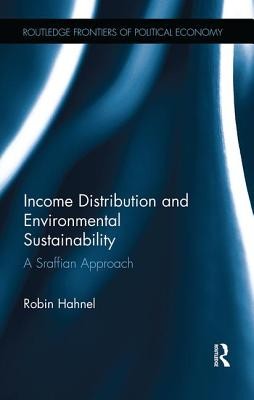
- We will send in 10–14 business days.
- Author: Robin Hahnel
- Publisher: Routledge
- ISBN-10: 1138335991
- ISBN-13: 9781138335998
- Format: 14 x 21.6 x 0.9 cm, minkšti viršeliai
- Language: English
- SAVE -10% with code: EXTRA
Income Distribution and Environmental Sustainability (e-book) (used book) | bookbook.eu
Reviews
Description
Any economics that does not deal forthrightly with economic inequality is no longer suitable for the twenty-first century. Similarly, any economics which does not provide a coherent way to integrate environmental sustainability into economic analysis will fail to command allegiance in the century ahead. This book demonstrates how the Sraffian framework provides important advantages in both areas.
Divided into three chapters, Income Distribution and Environmental Sustainability provides a rigorous exposition of Sraffian theory emphasizing what it means for the economy to be productive, extends Sraffian theory to address environmental sustainability, and adds a normative theory of income distribution to Sraffa's positive theory. In Chapter 1, a rigorous version of the basic Sraffa model is presented which focuses on what it means for the economy to be capable of producing a physical surplus, explains the origin of profits, and shows how to measure changes in overall labor productivity resulting from any technical change. In Chapter 2, the basic model is extended to incorporate primary inputs from the natural environment, rigorously measure changes in environmental throughput efficiency, and establish sufficient conditions for environmental sustainability. In Chapter 3, an explicit normative theory of economic justice is elaborated which is a natural extension of Sraffa's positive theory of income determination and consistent with modern egalitarian literature on distributive justice.
This book is of interest to academics and students who study political economy, economic theory, and philosophy, as well as those interested in the work of Piero Sraffa.
EXTRA 10 % discount with code: EXTRA
The promotion ends in 21d.10:45:16
The discount code is valid when purchasing from 10 €. Discounts do not stack.
- Author: Robin Hahnel
- Publisher: Routledge
- ISBN-10: 1138335991
- ISBN-13: 9781138335998
- Format: 14 x 21.6 x 0.9 cm, minkšti viršeliai
- Language: English English
Any economics that does not deal forthrightly with economic inequality is no longer suitable for the twenty-first century. Similarly, any economics which does not provide a coherent way to integrate environmental sustainability into economic analysis will fail to command allegiance in the century ahead. This book demonstrates how the Sraffian framework provides important advantages in both areas.
Divided into three chapters, Income Distribution and Environmental Sustainability provides a rigorous exposition of Sraffian theory emphasizing what it means for the economy to be productive, extends Sraffian theory to address environmental sustainability, and adds a normative theory of income distribution to Sraffa's positive theory. In Chapter 1, a rigorous version of the basic Sraffa model is presented which focuses on what it means for the economy to be capable of producing a physical surplus, explains the origin of profits, and shows how to measure changes in overall labor productivity resulting from any technical change. In Chapter 2, the basic model is extended to incorporate primary inputs from the natural environment, rigorously measure changes in environmental throughput efficiency, and establish sufficient conditions for environmental sustainability. In Chapter 3, an explicit normative theory of economic justice is elaborated which is a natural extension of Sraffa's positive theory of income determination and consistent with modern egalitarian literature on distributive justice.
This book is of interest to academics and students who study political economy, economic theory, and philosophy, as well as those interested in the work of Piero Sraffa.


Reviews